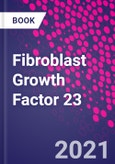Fibroblast Growth Factor 23 describes how FGF23 was initially identified as a bone-derived factor targeting the kidney. As such, sections in this comprehensive book cover exciting research that shows that different FGF23 effects require distinct signaling receptors and mediators that differ among target tissues, cover FGF23 initially identified as a bone-derived factor targeting the kidney, look at FGF23 as a regulator of phosphate metabolism and beyond, and cover research on novel concepts of FGF receptor signaling. Additional sections cover biochemistry, pharmacology and nephrology, making this book an ideal reference source on FGF23.
Please Note: This is an On Demand product, delivery may take up to 11 working days after payment has been received.
Table of Contents
1. The discovery of FGF23
a historic view: genetic disorders of hypo- and hyperphosphatemia
2. FGF23
an established master regulator of phosphate metabolism
3. FGF23
more than a phosphaturic hormone
4. The regulation of FGF23 production in bone and outside of bone
5. Klotho-dependent actions of FGF23
targets, signal transduction and cellular effects
6. Klotho-independent actions of FGF23
targets, signal transduction and cellular effects
7. The experimental detection of FGF23 responsiveness and effects
8. FGF23 and bone disease
9. FGF23 and kidney disease
10. FGF23 and heart and vascular disease
11. FGF23 and inflammation, anemia, and iron
12. FGF23 and infectious diseases
13. FGF23 and lung disease
14. FGF23 and neuro-cognitive disorders
15. FGF23 as a drug target
16. FGF23
resolved issues, remaining controversies and future questions
a clinician's perspective
17. Klotho
the discovery of the FGF23 co-receptor
18. Klotho
an FGF23-independent hormone
19. Klotho and aging phenotypes
20. ?Klotho gene and protein measurements in humans and their role as a clinical biomarker of disease
21. Structural Basis of FGF23 Hormone Signaling
22. Klotho
open questions, controversies and future perspectives
23. The crosstalk between phosphate, FGF23 and klotho in the regulation of tissue homeostasis in health and disease








